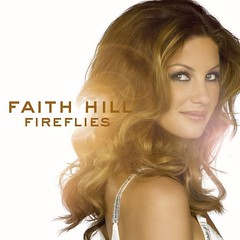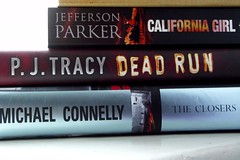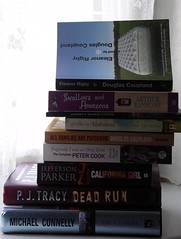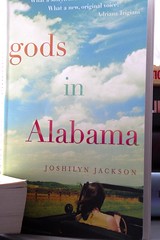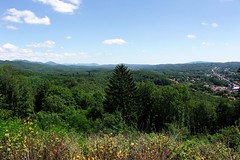 haute saone
haute saone
Originally uploaded by mcmrbt.Plancher Bas, the village in which my wife grew up is in the French Département of Haute Saone, number 70, right over on the eastern side, near Switzerland. It's about as far from the sea as you can get, and it's an economically depressed area, without much in the way of industry, and without even the compensation of a climate decent enough to grow wine. The nearest big town is Belfort, which is worth about 2 hours if you're in the mood for a bit of shopping. It, too, is economically depressed, giving the impression of faded greatness, a sleeping giant. Belfort is the only city in France, apart from Paris, that exists as its own Départment, number 90. Oh, it has an old town and fortifications and the famous Lion of Belfort, but that's not the sort of thing that interests me.
Belfort's status is something to do with the part of France it is in, the area having been invaded repeatedly over the years. Alsace, of which more in a moment, to the North East, has been part of Germany, and part of France again several times. Now, like Wales, Alsace is neither one thing nor the other, insisting on its own dialect, but speaking French and German when it feels like it, and only barely tolerating visitors from across the border.
I first visited Plancher in the summer of 1994, just after I finished my first degree, and we spent a while there, and drove South to camp on the Côte D'Azure for a week, and drove back to spend more time. Since then, we've visited about twice a year, summer and Christmas, and I know the area well enough. My children have spent every Christmas but one in France and know only the French way of doing things.
It's a 10-12 hour drive from the UK, and not the kind of place you'd think of for a holiday destination (especially based on what I've said so far). It's not even a place you'd consider for a skiing holiday: you'd go to the Alps, wouldn't you, where the snow is more guaranteed, and the slopes steeper and longer.
My wife has flown over on a couple of occasions – times when I couldn't make it, for one reason or another. Until recently, flying wasn't very convenient. From Birmingham, you had to fly KLM to Amsterdam, and then from Amsterdam to Basel-Mulhouse, the nearest airport, which is part Swiss, part French (and not very close to Mulhouse, either). For a direct flight, you had to use Crossair, the collaboration between British Airways and Swissair, and fly from Heathrow. Both choices were shockingly expensive, in this age of cheap air travel, and for use only in exceptional circumstances. For a family of four, it was certainly cheaper to use the Channel Tunnel, pay the tolls and drive down the motorways, and even stop for a night in Reims to break the journey.
But now that's all changed: Easyjet now flies direct from Luton to Basel, and for a two-week stay that same family of four can now fly direct and hire a medium-sized car for the same price as the Tunnel/Motorway/Hotel option. For a short break, and if you're met at the airport by your in-laws, it's obviously a lot cheaper. All of the usual caveats about booking early with Easyjet for the cheapest seats apply.
(You also have to be willing to put up with Luton Airport, which is run like a banana republic's version of Jeux Sans Frontiers, but that's another story.)
All of this means that this Eastern part of France is ripe for holiday discovery. Because for "economically depressed" you can read "unspoiled", and you can add other adjectival phrases like "off the beaten track" and "spectacular scenery." For now, at least, this is a part of France that doesn't have to feel "done to death" and where every other car you see on the roads isn't "sporting a UK plate."
So is it worth a visit? I'd say a qualified yes. Children of a certain age won't enjoy the kind of holiday that involves a lot of touring in a car and trudging round picturesque villages and towns. We're lucky in that we can abandon our children with the grandparents, leave them paddling in the inflatable in the garden or visiting goats and donkeys and picking mushrooms in the forest. For the similarly unencumbered, I highly recommend it.
Beautiful? Can you spell G R E E N? And if there aren't exactly mountains to match the Alps and the Pyrennees, you've got your Ballons des Vosges, plenty of challenging climbs for walkers and cyclists (including the Ballon d'Alsace, as seen on this year's Tour), and spectacular views. This is an area where people ski, so you'll see the odd ski-lift, often used in the summer for taking people up for the view, or to run down the concrete luge.
There are markets and festivals, zoos, exhibits, all the usual tourist fodder. For myself, there's nothing beats a pleasant drive along winding country roads, and the occasional stop in an interesting village.  Ronchamp, quite near to Plancher Bas, features the just-50-year-old Notre Dame du Haut chapel built by Le Corbusier to replace one that was bombed in the war: that's worth a visit. And you'll find lakes, rivers, forests, unspoiled views, and plenty of fresh air.
Ronchamp, quite near to Plancher Bas, features the just-50-year-old Notre Dame du Haut chapel built by Le Corbusier to replace one that was bombed in the war: that's worth a visit. And you'll find lakes, rivers, forests, unspoiled views, and plenty of fresh air.
Let's be honest about the climate, though. I've seen deep, deep, snow in winter (don't worry, even the smallest village will have roads cleared by snow ploughs - they expect snow, so they're well prepared), and I've experienced the kind of hanging heat of summer that makes you go wow - 37-40 degrees of Celsius. And I've seen amazing thunder and lightning storms (always entertaining), but the weather I've experienced most frequently over the years has been rain.
In winter, sometimes, we've had a week of rain, so much that you couldn't get out of the house to take a restoring walk; in summer, it's always guaranteed to rain once or twice when I'm there. This morning, for example (I'm writing this on the 5th August), we had clear blue skies, and it was lovely all day - till about 4 o clock, when the clouds came over and threatened rain. There were a few spots, but it never really came (though on most such occasions it would).
The day we arrived, this summer, there was so much rain that the basement flooded - something that hasn't happened in the 40 years my in-laws have been here.
On the other hand, we've experienced heat waves, too, and heard about droughts and so on, so it's pot luck, the weather is. Because of all the hills and mountains, the term microclimate applies. The weather really can be different on the other side of a hill.
Which is why you'll want to take several side trips into Alsace, and that's as it should be.
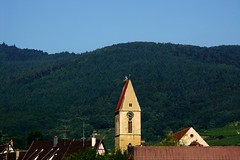
Because if Haute Saone is undiscovered France, Alsace is "second most popular destination" France - and with good reason. It isn't the Mediterranean coast, and it isn't the Vendée, but it is a wealthy and beautiful part of the country (the Rhin Départements are numbered 67 and 68).
In 67, you have Strasbourg, home to European Parliament, and worth a day trip. In 68, you have Colmar, home to mediaeval timbered buildings in labyrinthine streets and good shopping. To reach both, you can either shoot up the N road or Motorway and remark on the scenery, or you can drive through it. You can go to both cities along the Route des Vins, or you could just drive the Route for the sheer pleasure of it. You're surrounded by wonderful views, vineyard after vineyard spread across rolling hills, and even creeping into the villages themselves (people seem to have vines instead of gardens in some places). And the villages are often very, very beautiful, like Riquewir, and fascinating, stuffed full of wineries offering tastings and wine by the case. If not wine, try the biscuits!
Most Brits think Alsatian wine is like German wine, has a reputation for being sweet and/or fruity, but that's because a lot of them haven't tasted Crémant d'Alsace, the local sparkling which is so good that the French seem to keep it all for themselves. I haven't seen it in many British supermarkets, at least, which is odd, because as a celebration drink there's almost nothing better - it's méthode Champenoise, but much, much cheaper (of course). You'll want to buy a couple of cases (of 6) for your next do, I guarantee it.
Several of the wine route villages are worth a stop, and you'll have to try the local dish(es), too, of course. I can take or leave the Choucroutte, which is sauerkraut with spicy sausages, but the tarte flambée, on the other hand, is to die for. It's essentially a very thinly based pizza with cream instead of tomato sauce, topped with lardons (bacon) and onion, and cooked very rapidly in a wood-burning oven. Visit a restaurant cooking them properly over wood, and you'll be served your tarte a very few minutes after you order.
The basic recipe is as above, and you can have it gratinée, with Gruyere, for a more pizza-like experience (not really necessary), or with a huge variety of toppings, just like pizza. Be sure to try the basic traditional recipe before you try the variations. Some places offer toppings with potato, or Montbeliard sausage, or just about anything. I've even seen it offered with snails or frog's legs, but that's just taking the piss.
Wash it down with an Alsatian beer, of course, though ask for a Buckler or Kronenberg Pur Malt if you're driving.
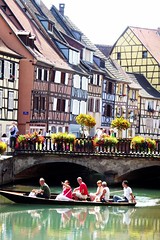
So, where were we? Strasbourg, Colmar, Route des Vins, crémant, tarte flambée, beer... oh yeah: castles. Haute Koenigsburg is worth a visit: it's a 19th century re-creation of the mediaeval castle experienced, perched on a hilltop looking out over those vineyards.
So you'll be spending a couple of days in Alsace, particularly if the weather in poor in Haute Saone, and the weather in Alsace is always better (true). But you wouldn't want to stay there, because Alsatians... well. Just watch out for the drivers with the 68 and 67 plates is all I'll say. You won't miss them: they'll be pulling out on you and tailgating you almost as soon as you cross the border.
And if you get back to Haute Saone, and you've developed a liking for wine tasting, or the weather is still acting up, drive South and you're in Jura - more spectacular scenery (the architecture is more alpine-Swiss there), more lakes, more castles, more wine, and - of course - Crémant de Jura, the local tipple... But that's another story.


 The thing I've always liked about VW designs is that they are - wisely - incredibly conservative. They don't go for the striking looks of your Renaults and your Citroëns, and they can indeed look positively dull when first released. A prime example of this is the Touran mini MPV, which is positively generic. But a VW will continue to look generic throughout its model lifetime, whereas your trendy fashion-victim cars look dated very quickly. Such are the vicissitudes of trends.
The thing I've always liked about VW designs is that they are - wisely - incredibly conservative. They don't go for the striking looks of your Renaults and your Citroëns, and they can indeed look positively dull when first released. A prime example of this is the Touran mini MPV, which is positively generic. But a VW will continue to look generic throughout its model lifetime, whereas your trendy fashion-victim cars look dated very quickly. Such are the vicissitudes of trends.





 Ronchamp
Ronchamp

